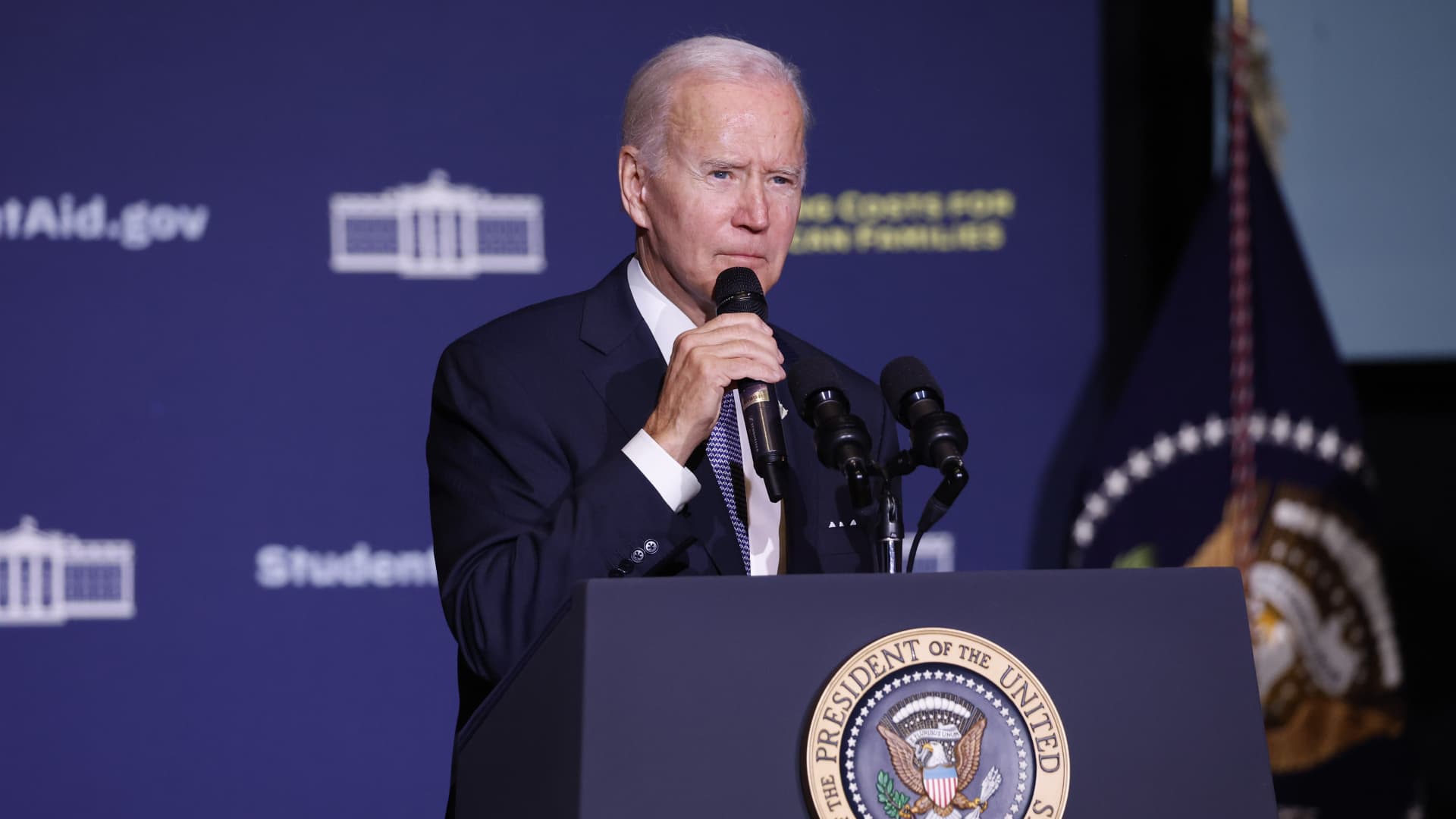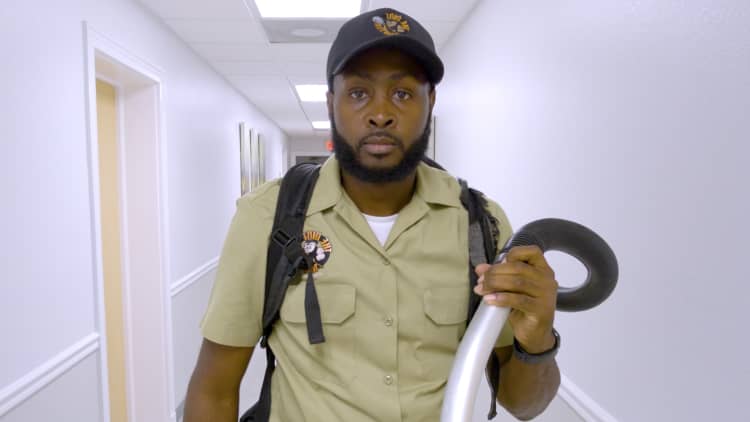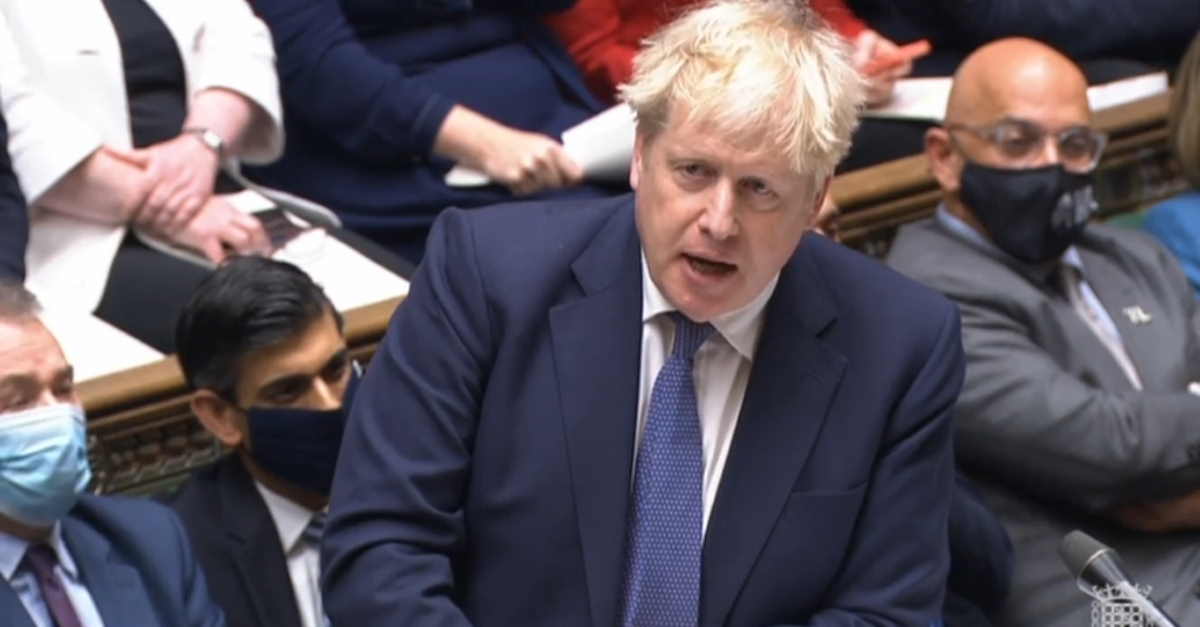Student debt forgiveness is on hold for now—here's why it's blocked and what could happen next
The Biden administration immediately appealed a federal judge's block on forgiving student debt, but the application is closed for now.

After appearing to clear a number of other legal hurdles, President Joe Biden's student debt forgiveness plan has been blocked.
Last week, a federal district court in Texas issued a ruling calling the plan "unconstitutional," which the Department of Justice has already appealed on Biden's behalf. And on Monday, addressing a separate lawsuit, the 8th Circuit Court of Appeals continued an existing pause on the relief while it considers the plaintiff's arguments.
The bottom line for borrowers: You probably won't be seeing your debt balances reduced as soon as the president had said. The administration maintains its legal authority and says it's continuing to fight for borrowers, but many questions remain as to what comes next.
What are the lawsuits about?
Plaintiffs in the Texas case are two individuals — backed by conservative organization Job Creators Network Foundation — who allege the forgiveness plan unfairly excludes them and therefore shouldn't be allowed.
The other suit, officially known as Nebraska v. Biden, comes from a group of six states — Nebraska, Missouri, Arkansas, Iowa, Kansas and South Carolina — that claim the forgiveness would hurt them in the form of lost tax revenue.
Despite the surface differences, both suits are essentially arguing the same thing, says Abby Shafroth, an attorney at the National Consumer Law Center. "They're effectively challenging that the Biden administration has gone beyond the authority that Congress granted them within the HEROES Act," she tells CNBC Make It.
What does this mean for borrowers who applied for forgiveness?
Essentially, more waiting. The administration says it's holding onto the 26 million applications it has already received for forgiveness, adding that 16 million of those have already been approved and forwarded to loan servicers.
There's nothing more borrowers can do but wait for a final decision. Many expect the Supreme Court will eventually have to get involved. That outcome becomes less likely if both the circuit courts agree.
If the president's appeal in Texas is successful, it's likely the plaintiffs will escalate the case to the Supreme Court or vice versa.
"It's really hard to say at this point what the trajectory is going forward, time-wise, but we're encouraged that the administration has appealed," Persis Yu, a student loans expert and deputy executive director of nonprofit advocacy organization Student Borrower Protection Center, tells CNBC Make It.
"We think that there's other steps that the administration needs to be doing to protect borrowers and to protect this debt relief, but it's a good step."
Could the legal battles have been avoided?
Some debt forgiveness proponents argue that Biden could have chosen a different method or legal justification to provide relief to borrowers that wouldn't have been met with such fierce legal challenges.
But many lawyers and legal experts have met the judges' rulings with skepticism, saying their interpretations of the laws are wrong.
Plaintiffs for both lawsuits struggled to win the favor of the lower courts that challenged their standing. And Yu adds these weren't "liberal courts" that might otherwise be accused of partisanship for siding with the president.
"I think it is pretty notable that every other court who has considered this has reached a different conclusion," Yu says of the ruling in Texas. "I think that speaks more to the judge than it does to the legality of the issue, but this is in a broader context that we've seen the court systems being politicized."
Though student debt affects people from both sides of the political aisle, support for the government action to ease the burden on borrowers routinely falls along party lines, with Democrats around twice as likely to support debt forgiveness than Republicans.
The courts are supposed to be non-partisan. Still, federal judges are appointed by elected officials, and it so happens the judges striking down Biden's debt forgiveness were nominated by Republican presidents. Many commentators believe forgiveness has become less of a legal issue and more of a political debate.
"Most legal experts who have looked at this think that none of the parties who filed suit so far actually have standing," Shafroth says. "So none of these cases should be moving forward. They should all properly be dismissed if we're just looking at this as a black-and-white matter of the law."
How has the Biden administration responded to the block?
Aside from appealing in Texas, the president has not yet announced next steps for the debt forgiveness plan or other relief for borrowers.
The administration maintains it has legal authority and says it "will never stop fighting for hardworking Americans most in need — no matter how many roadblocks our opponents and special interests try to put in our way," according to a statement from White House Press Secretary Karine Jean-Pierre.
The administration has not otherwise announced a continuation of the payment pause that has been in effect since March of 2020. It is currently set to expire on December 31 of this year.
Unnamed officials inside the administration are considering extending the payment pause, the Washington Post reports. The discussions are preliminary, though, and not focused on an indefinite pause but rather another temporary hold.
Turning payments back on could undermine the administration's reasoning for forgiveness in the first place, Yu says.
"The whole premise of this debt relief, as they laid out in their briefing, was that this debt relief program is designed to alleviate the burdens of restarting a repayment plan," she says. "It seems like you would have to extend the payment pause so that the administration can figure out the pathway to get this relief to borrowers."
When asked for comment, the Department of Education referred CNBC Make It to a statement from U.S. Secretary of Education Miguel Cardona, which makes no mention of the payment pause. The Department of Education declined to comment on whether the payment pause would continue.
What will happen if the pause isn't extended?
Federal loan borrowers would see their student debt reduced by up to $20,000 under Biden's plan. But the move could also lower their monthly payments. The administration "laid out significant economic analysis to show that restarting repayments will result in higher delinquency and default rates," Yu says.
With just over a month before payments are scheduled to resume, borrowers who were already struggling financially may be forced to scramble to make room for student loans in their budgets.
"We do think that it would be a catastrophic number of borrowers who would default and then, given the consequences, I think we would see a huge impact for a lot of folks on their ability to meet their basic economic necessities," Yu says.
Advocacy groups, including Yu's, have called on Biden to extend the payment pause at least while the legal challenges play out. Some say Congress could step in to help borrowers, too.
"If you look at the opinions both in Texas and 8th Circuit, they're looking for ... a clear mandate from Congress that the Department of Education would be authorized to forgive these loans," says Rebecca Natow, a higher education education policy expert and assistant professor of educational leadership and policy at Hofstra University.
Getting that Congressional approval wouldn't be an easy task. It would be easier with the House and Senate controlled by Democrats, however, as both chambers will be at least through the end of this year.
"I think it's a possibility that Congress can act to give the Biden administration authority," says Natow.
Will the issue make it to the Supreme Court?
It's certainly possible. If both circuit courts agree on the legality of the forgiveness plan, Shafroth says it's less likely the Supreme Court would weigh in unless the Justice Department appealed those outcomes.
Alternatively, if one court finds the plan unlawful but the other court disagrees, the highest court may have to settle the dispute.
"They would want to resolve that inconsistency so that there's one clear rule for the whole country," Shafroth says. The 8th Circuit Court's decision to keep the block on debt forgiveness for now adds to the likelihood of a Supreme Court case, she says.
"The fact that these cases are moving beyond standing certainly makes it more likely that at least one case will ultimately reach the Supreme Court, but it's still too early to say," Shafroth says.
The Supreme Court has so far declined to hear other suits regarding Biden's debt forgiveness, but it has not yet thoroughly reviewed the plan on its legal merits.
What if I didn't apply for forgiveness yet?


 JaneWalter
JaneWalter 































